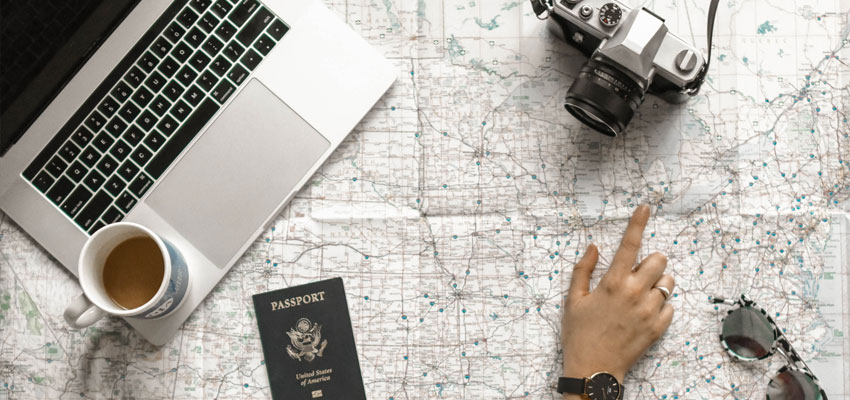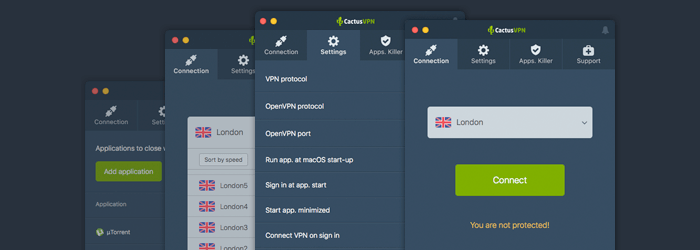6 Reasons You Need to Use a VPN for Travel

Not sure if you should use a VPN for travel during your next vacation? Don’t worry – we’ll tell you everything you need to know about this.
Now, the short answer is yes, you should definitely use a VPN when traveling abroad. In case you’d like to know exactly why, just read on or use our Table of Contents links.
Table of contents
What Is a VPN?
A VPN is a service you can use when you’re connected to the Internet to access online content in a safe, unrestricted manner anywhere in the world.
Basically, once you have Internet access, you run the VPN, connect to a VPN server, and then start browsing the web at your leisure. All the online traffic and data that is shared between you and the server in question is 100% protected, meaning nobody can monitor or steal it. Your digital footprints and Internet address are also hidden when using a VPN.
Here’s Why You Need a VPN for Travel
1. It Helps You Bypass Censorship
Traveling abroad can sometimes mean having to put up with annoying online government restrictions. You might have to deal with just one of your favorite websites being blocked, but there’s also the risk that a whole lot of other services are inaccessible too because of government interference.
For example, if you go on vacation to China, you won’t be able to access Facebook, Google, or YouTube. Some Google services – like Gmail – might also not be available in places like Cuba, Iran, North Korea, Syria, and Sudan. That can be quite a problem – especially if you need to check your email daily to communicate with your family or clients/employers (if you’re a freelancer).
If you happen to visit places like Egypt, Mexico, Jordan, or Qatar, you might also have to put up with some VoIP services not being available because the government orders ISPs to block them. So, there’s a chance you might not be able to Skype with your loved ones when you’re back at the hotel.
Why do some governments enforce such restrictions? It depends, though their reasons are often linked to the political climate. Also, it’s worth noting that countries that continuously block websites and online services are not your only problem.
For instance, you could visit a country that doesn’t normally block Facebook, but you might be unlucky enough to visit during a huge protest. In that case, there’s a chance the government could force ISPs to block access to Facebook to stop the event from getting too much attention. That’s not really a speculation – it already happened in Vietnam, Sri Lanka, and many other countries.
Luckily, a VPN can help you bypass any government-imposed content blocks. It masks your IP address, so you’ll be able to circumvent any firewalls that stand in your way.
2. A VPN Lets You Unblock Content
Traveling abroad can definitely be a lot of fun, but sometimes you just want to relax back at your hotel with one of your favorite shows before going to bed. Well, that’s when you’ll quickly realize that there’s one big obstacle standing in the way of your entertainment and convenience – geo-restrictions.
Basically, they prevent you from accessing certain Internet content based on the geographical location you are connecting from.
For example, if you travel to Spain, you won’t be able to access websites from the UK or the US. At the same time, certain websites (like Google) will be displayed in the country’s native tongue, potentially complicating online browsing for you.

A VPN can help you deal with this problem by hiding your real IP address, and making it seem like you’re connecting to a geo-blocked website from a different, “acceptable” country. So, for instance, if you were to visit Poland and connect to a US-based VPN server, you’d be able to access US websites (like Pandora Radio) that aren’t normally available to users outside the country.
3. You Can Secure Your Internet Privacy
When you’re abroad, WiFi is a must. Whether it’s WiFi at the restaurant you eat at, the cafe you have breakfast at, the airport or train station, or your hotel, it’s always a welcome addition. Well, just keep one thing in mind – the Internet you get to enjoy is provided by an ISP in the country you visit.
And that ISP can monitor everything you do online – including what you search for. That’s quite an invasion of privacy, right? Especially if you’re looking up more intimate and sensitive topics. What’s more, if you happen to travel to the US, for instance, there’s a risk your online traffic and browsing habits could be monetized by an ISP – they can sell that kind of data to third-party advertisers, after all.
Speaking of ads, the things you look up will be logged by search engines, and used to serve you personalized ads. For some of you, that might not be a big issue, while many of you might be bothered by this. But since you’ll be looking up certain keywords in a foreign country, that means you’re likely going to get bombarded with “personalized” foreign ads in the future.
Pretty annoying, right?
Also consider this – maybe you want to have a VoIP call with some family member, friend, or your significant other. Maybe your conversation is a bit more personal than just a simple chat. Well, the problem is that the hotel, restaurant, or airport’s ISP can monitor your VoIP traffic if they want to.
That’s not all, sadly. A foreign ISP isn’t the only one that will be able to keep an eye on your online activities. Cyber criminals can do that too – especially if you use an unsecured WiFi network. Hackers can actually eavesdrop on all your browsing activities and communications – including text messages and emails!
That all sounds pretty bad and shady, but there’s good news too – a VPN can protect your privacy on any WiFi network by encrypting all your Internet traffic, effectively making sure nobody knows what you’re doing online. Also, a VPN can offer you a certain degree of anonymity to help you mask your digital footprints, and help protect you from targeted ads.
4. It Protects You from Hackers
Let’s face it – when you travel abroad, you often need to make online payments, whether it’s sending someone money or buying an extra day trip. That generally involves accessing your bank account(s). If you don’t have any more data on your mobile plan, you’ll probably often resort to using any WiFi network you can connect to in order to do that.
Well, remember what we just said about cyber criminals being able to monitor your online traffic on unsecured WiFi networks? They aren’t just able to see what you’re talking with other people – they can also steal important data like credit card details and login credentials. Yes, there’s a huge risk you’d end up penniless in a foreign land if you don’t take the proper security precautions.
And that’s not all – cyber criminals can also set up fake WiFi networks in an attempt to lure you in and steal your data. They could even imitate your hotel’s WiFi.
Even worse, hackers can exploit the KRACK vulnerability to comprosie WiFi networks that should be secured with WPA2 or WEP. So yeah, even WiFi networks with a password aren’t completely safe for tourists anymore. Sure, WPA3 is going to fix that vulnerability, but it’s still not fully deployed or integrated with most network devices.
Luckily, you won’t need to worry about any of that because using a VPN for travel means all your data will be encrypted when you’re online, making sure no hackers can get their hands on it. Yes, even on unsecured WiFi networks or secured – but compromised – networks.
5. It Could Help You Save Money on Flights
You can’t always buy your plane tickets in advance. Sometimes, you just have to make last-minute changes, head back home immediately because of an emergency, or just want to travel to a different country on a whim – it happens.
Well, in that case, you’ll be happy to know that using a VPN can potentially help you find cheaper flight options. Why’s that? Because of online price discrimination – a practice in which airlines tend to display different ticket prices to users based on 2 things:
- What country they are connecting to the airline website from. Lower-income countries could receive lower ticket prices – especially due to currency conversions – or better discounts.
- If the user is a recurring website visitor or not, which is usually based on how many visits the airline website logged from their IP address.
So, you could connect to a VPN server in a different country to try and see if the airline website you plan on buying your tickets from would display better prices.
Though, please keep in mind this isn’t something that’s guaranteed. You won’t get discounts by using a VPN 100% of the time. Also, the amount of money you can save can vary a lot. According to many online users, the amount can range from a couple of dollars to hundreds of dollars.
We actually wrote an article on this topic if you’re interested to know more. Basically, by using CactusVPN, we were able to get a deal with United Airlines that helped us save around $450. Oh, and keep in mind you need to delete tracking cookies on your device alongside using a VPN for the best results.
6. A VPN Helps You Torrent Safely
Even when we’re on vacation, you sometimes have to resort to file-sharing – whether you need quick access to certain software, or you just want to unwind with some of your favorite shows or cartoons without having to set up an account and pay for the service on the spot.
There’s just one problem – depending on what country you vacation in, you might not be able to enjoy P2P properly. In many places, this kind of activity is really frowned upon – like in the US or Canada – and usually gets online users in legal trouble or threatened with DMCA notices.

Now, you’re not really likely to end up in court or prison as a tourist. However, you might be kicked off the hotel’s WiFi network, for example, which can definitely be annoying – not to mention you’ll have to explain what happened to the receptionist, and be put in an uncomfortable position.
With a VPN for travel by your side, there shouldn’t be any issues. Your traffic will be fully encrypted, so your hotel or the ISP the hotel works with won’t be able to see that you’re using P2P applications or downloading torrents. At the same time, if a P2P website or application is blocked on the hotel’s network, you’ll be able to easily bypass the firewall restrictions with a VPN.
As a disclaimer, we here at CactusVPN do not endorse copyright infringement, but we are aware that – for some people – torrenting is the only way they can get access to the files and entertainment they need.
How to Get a VPN for Travelling
It’s pretty simple – you just browse through different VPN provider options, and choose the service that best suits your needs. Ideally, you should look for a provider that offers decent encryption, fair pricing, and a no-logs policy to really ensure your privacy is protected.
That, and make sure the provider in question offers VPN apps that work across multiple devices and operating systems. After all, you could be using your phone while you’re out exploring the town, and your laptop when you’re back at your hotel, so cross-platform compatibility is a must.
“Can I Use a Free VPN for Travel Abroad?”
Using a free VPN could seem convenient – especially if you only need the service for a few days only. However, the “free” bit is pretty much the only advantage you’d get to enjoy. Other than that, you’d be exposing yourself to some serious riks:
- Having your devices infected with malware.
- Having your device’s bandwidth sold and treated like a botnet.
- Getting constantly spammed with ads.
- Having your data sold to advertisers – kind of defeats the purpose of using a VPN, right?
- Not having your data properly encrypted when you’re online – which is extremely dangerous!
In case you’d like to learn more about that, we have an in-depth article explaining just how dangerous free VPNs can be.
CactusVPN – The Best VPN for Travel
No matter what country you’re traveling to, and how long you’re gone, CactusVPN will help you enjoy a smooth, safe online experience. Our cross-platform, user-friendly apps will make sure of that, for one.
Also, we offer high-end AES encryption to secure your data, and a choice between 6 VPN protocols to help you tweak your connections. Plus, we don’t keep any logs, so you can rest assured that your privacy will be safe and sound.

We offer access to multiple worldwide servers – with locations in Europe, Asia Pacific, and America. 9 of our servers even have P2P support if you’ll ever need to engage in file-sharing while abroad + all our servers come with unlimited bandwidth.
Oh, and if you happen to need even more content variety, we’ve got you covered with our Smart DNS service. Basically, you can directly unblock over 300 geo-restricted websites from around the world with just a few clicks!
Special Deal! Get CactusVPN for $3.5/mo!
And once you do become a CactusVPN customer, we’ll still have your back with a 30-day money-back guarantee.



